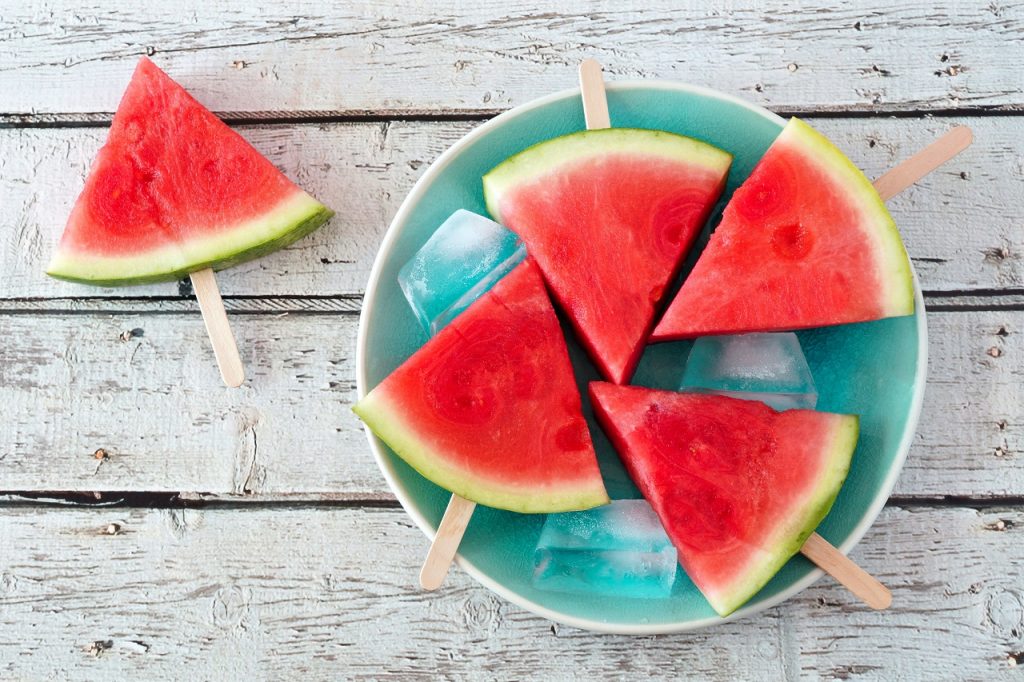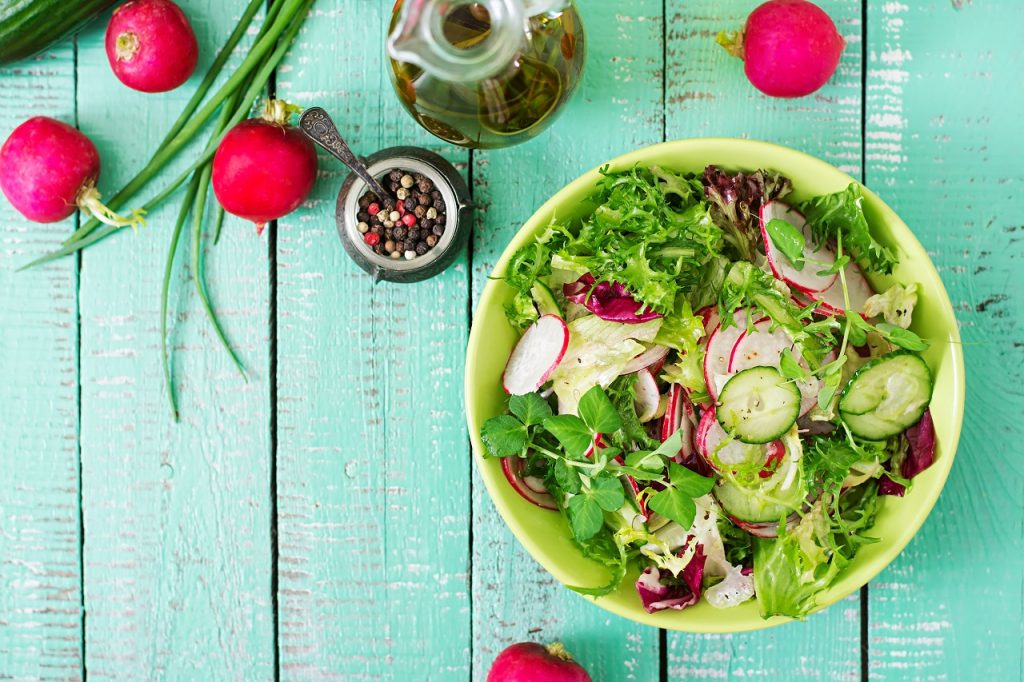 The rising temperature often leaves us irritated and low on appetite. We may feel it’s because of the heat, but often, our lifestyle and food habits are also responsible for this change. In this view, continuing with wrong food choices may lead to skin eruptions, profuse sweating, summer strokes and gastric disturbances like indigestion, diarrhoea, bloating, stomach aches, vomiting and dehydration. Let’s look at what we should eat and avoid during summer!
The rising temperature often leaves us irritated and low on appetite. We may feel it’s because of the heat, but often, our lifestyle and food habits are also responsible for this change. In this view, continuing with wrong food choices may lead to skin eruptions, profuse sweating, summer strokes and gastric disturbances like indigestion, diarrhoea, bloating, stomach aches, vomiting and dehydration. Let’s look at what we should eat and avoid during summer!
What Should You Eat?
- Fluids: It’s no secret that water is required in ample amounts during summer to keep ourselves hydrated and replenish the lost water via sweating. But it doesn’t have to be plain water. Include the lesser boring and interesting options of Aam panna, coconut water, infused waters and lemon water to fulfill the daily fluid requirements along with the goodness of vital minerals!
- Melons and cucumbers: Water melons, musk melons and cucumbers are found abundantly during summers. They are profusely watery and chock-a-block with vitamins, minerals, fiber and essential antioxidants. Having them will make sure you avoid dehydration and summer strokes.
- Leafy and gourd vegetables: These are easily digestible vegetables and contain all the necessary minerals and vitamins needed to keep your strength during summers intact. You may never see anyone overeating a leafy or a gourd vegetable. Light on the stomach and simpler to process by the body, make them the staples of summers.
- Onion and garlic: Allium and Sulphur compounds from onion and garlic are antidotes to heat strokes. They are age old methods to cure summer sickness and work just right till date. Include them in your meals and witness the headache caused because of being out for long in the sun wearing off.
- Curd or buttermilk: Packed with calcium, protein and probiotics, yoghurt can be the rescue for all digestive troubles and generally running it smoothly. Make a bowl of plain home made curd or buttermilk with fresh mint, cumin and black salt, a regular in summer afternoons.
- Sabja seeds: These seeds soaked for 10 minutes in water are a potent ease to the digestive system. They cool the body down from the inside like a whiff of cool air would do from the outside. Besides that, it is also a source of essential fatty acids like omega 3 and fiber.
What Should You Avoid?
- Commercially sold ice creams: The idea of avoiding ice creams during summers might sound bizarre, yet, there can be healthier options for this chilled indulgence. Conventionally, ice creams contain high amounts of fat and sugar that make them difficult to digest and easier to cause weight gain. Also, due to frequent change in the temperature of cold storages, ice creams often develop disease causing bacteria and should be avoided during summers. Consuming ice cream just after being exposed to sunlight might cause sore throat and fever due to sudden temperature fluctuation. Having home frozen yoghurt, kulfis or crushed fruit pulps can be occasional substitutes.
- Hot drinks: While the external heat has already led our body temperatures to rise, consuming anything beyond room temperature causes further increase in the overall temperature and results in disturbances of the digestive system causing bloating and bitter burping. Keep beverages like hot tea and coffees to the bare minimum.
- Fried foods: Fried and greasy foods are not easy to digest and often leave us bloated. Fried food makes the skin oily during the humid times, giving rise to skin problems like acne and also harms the digestive system.
- Spicy foods: Capsaicin found in chilies adversely boosts the body heat and results in excessive sweating, leading to dehydration and sickness. When the body is already fighting off heat, adding hot and spicy food irritates the stomach lining and may cause hyper acidity and belching.
- Meat: It is known to all that meat and meat products are not easy to digest. Excessive consumption of meat in the summer season increases the pressure on the digestive system. It contains high amounts of fat, proteins and carbohydrates which heat up the body while digesting it.
- Over indulging on mangoes: Excess of anything is bad and mangoes are no exception to this rule! Filled with healthy antioxidants and vitamins, mangoes are a must have for summers. However, they are high in natural sugar and overindulgence can cause skin infections, increase in body heat and a number of undesirable symptoms such as diarrhoea, upset stomach, and headaches, etc.
We hope this article helps you understand what you should eat and avoid during summer. If it helped, let us know your thoughts in the comments below.
You can find more articles on staying healthy during the summer here or you can also get these tips directly from an expert by subscribing for Personalised Health Coaching here.
#BeTheForce
 Summer is here and as the weather is only going to get hotter, it’ll take a lot more effort to stay hydrated especially if you’re spending long hours outside. Continuous exposure to high temperature and humidity without any rest and fluids can lead to lack of energy, dizziness headache, weakness and sometimes severe cramps and fluid retention. Instead of eating heavy and hot food, you need something light – like some good summer salads!
Summer is here and as the weather is only going to get hotter, it’ll take a lot more effort to stay hydrated especially if you’re spending long hours outside. Continuous exposure to high temperature and humidity without any rest and fluids can lead to lack of energy, dizziness headache, weakness and sometimes severe cramps and fluid retention. Instead of eating heavy and hot food, you need something light – like some good summer salads! Indian summers were always hot, but now they have turned lethal. Studies indicate that temperatures across many districts in India will exceed by two degree Celsius by the end of the next two or three decades. So our huge population is likely to be exposed to the risk of summer hazards. Hence, I feel the need to talk about the most common summer health hazards.
Indian summers were always hot, but now they have turned lethal. Studies indicate that temperatures across many districts in India will exceed by two degree Celsius by the end of the next two or three decades. So our huge population is likely to be exposed to the risk of summer hazards. Hence, I feel the need to talk about the most common summer health hazards. We all know the Ozone layer is depleting, making the Sun’s harmful rays stronger than ever. It is only natural for us to take the necessary steps and protect ourselves from these rays. In this article, we will help you understand the importance of Sunscreen and why they are necessary to face Indian summers. Before we get to why you should be using sunscreen, it is also important to pick out the right product for you.
We all know the Ozone layer is depleting, making the Sun’s harmful rays stronger than ever. It is only natural for us to take the necessary steps and protect ourselves from these rays. In this article, we will help you understand the importance of Sunscreen and why they are necessary to face Indian summers. Before we get to why you should be using sunscreen, it is also important to pick out the right product for you.


